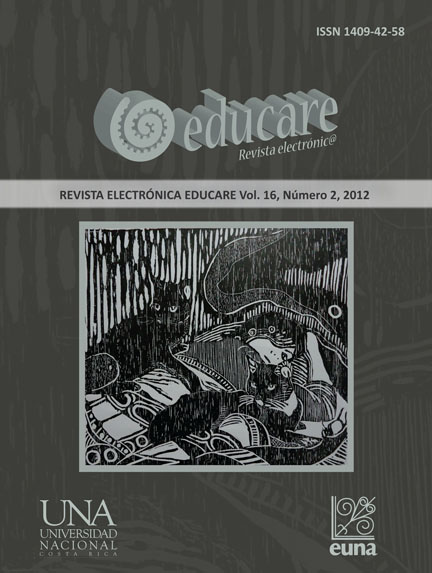Relevant Aspects on Teaching Probability and Statistics in Basic General Education
DOI:
https://doi.org/10.15359/ree.16-2.7Keywords:
Teaching, Probability, Statistics, teacher training, Basic General Education Curriculum, education, training processes.Abstract
Probability and Statistics were included in the Basic General Education curricula by the Ministry of Public Education (Costa Rica), since 1995. To analyze the teaching reality in these fields, a research was conducted in two educational regions of the country: Heredia and Pérez Zeledón. The survey included university training and updating processes of teachers teaching Statistics and Probability in the schools. The research demonstrated the limited university training in these fields, the dissatisfaction of teachers about it, and the poor support of training institutions to their professional exercise.
References
Arce, M. (1996). Estudio experimental de un proyecto de capacitación en Matemática con un grupo
de maestros de primer año de la Educación General Básica. (Tesis de Licenciatura inédita).
Universidad de Costa Rica, San José Costa Rica.
Barrantes, J., Bolaños, H., Céspedes, M., Delgado, E., Freer, D., Padilla, E. y Víquez, M. (2010).
Estado actual de la enseñanza y aprendizaje de probabilidad y estadística, en I y II Ciclo, en la
educación costarricense en las Direcciones Regionales Educativas de Heredia y Pérez Zeledón.
(Tesis de Licenciatura inédita). Heredia, Costa Rica: Universidad Nacional.
Chaves, E. (2007). Una valoración sobre la enseñanza de la estadística en los colegios académicos
diurnos: regiones educativas de San José, Alajuela, Heredia, Pérez Zeledón y Upala. (Tesis de
doctorado inédita). San José, Costa Rica: Universidad Estatal a Distancia.
Consejo Nacional de Educación Superior Universitaria Privada (CONESUP). (2009). Oferta
Académica de las Sedes Centrales. Recuperado de http://www.mep.go.cr/CONESUP/
OfertaAcademica.aspx
Godino, J. (febrero, 2002). La formación matemática y didáctica de maestros como campo de
acción e investigación para la didáctica de las Matemáticas: El proyecto EDUMAT-MAESTROS.
V simposio sobre aportaciones del área didáctica de la Matemática a diferentes perfiles
profesionales. Universidad de Alicante, España. Recuperado de http://personales.ya.com/
casanchi/did/edumat.pdf
Ministerio de Educación Pública (MEP). (2005). Programas de Estudios de Matemática: I y II Ciclo. San
José, Costa Rica.
Molina, M. (2001). La estadística y probabilidad en la formación de los maestros de educación
primaria. En Conselleria d’Economia, Comerç i Indústria. Govern de les Illes Balears (Ed.),
Jornades europees d’estadística. L’ensenyament i la difusió de l’estadística, (pp. 265-272). Sant
feliu, España: Sn Espanyolet. Recuperado de http://www.ibestat.es/ibfiles//content/files/
publicaciones/jornades_europees.pdf
Programa Estado de la Nación en Desarrollo Humano Sostenible. (2008). Estado de la Educación
(2ª ed.). San José, Costa Rica: Consejo Nacional de Rectores.
Torralbo, M., Maz, A., Vallejo, M. y Fernández-Cano, A. (2007). Formación del profesorado en
educación matemática en España: Producción de tesis doctorales y artículos. PNA, 1(4). 161-
Recuperado de http://www.pna.es/Numeros2/pdf/Torralbo2007Formacion.pdf
Downloads
Published
How to Cite
Issue
Section
License
1. In case the submitted paper is accepted for publication, the author(s) FREELY, COSTLESS, EXCLUSIVELY AND FOR AN INDEFINITE TERM transfer copyrights and patrimonial rights to Universidad Nacional (UNA, Costa Rica). For more details check the Originality Statement and Copyright Transfer Agreement
2. REUTILIZATION RIGHTS: UNA authorizes authors to use, for any purpose (among them selfarchiving or autoarchiving) and to publish in the Internet in any electronic site, the paper´'s final version, both approved and published (post print), as long as it is done with a non commercial purpose, does not generate derivates without previous consentment and recognizes both publisher's name and authorship.
3. The submission and possible publication of the paper in the Educare Electronic Journal is ruled by the Journal’s editorial policies, the institutional rules of Universidad Nacional and the laws of the Republic of Costa Rica. Additionally, any possible difference of opinion or future dispute shall be settled in accordance with the mechanisms of Alternative Dispute Resolution and the Costa Rican Jurisdiction.
4. In all cases, it is understood that the opinions issued are those of the authors and do not necessarily reflect the position and opinion of Educare, CIDE or Universidad Nacional, Costa Rica. It is also understood that, in the exercise of academic freedom, the authors have carried out a rogorous scientific-academic process of research, reflection and argumentation thar lays within the thematic scope of interest of the Journal.
5. The papers published by Educare Electronic Journal use a Creative Commons License:















 The articles published by Educare Electronic Journal can be shared with a Creative Commons License:
The articles published by Educare Electronic Journal can be shared with a Creative Commons License: 



